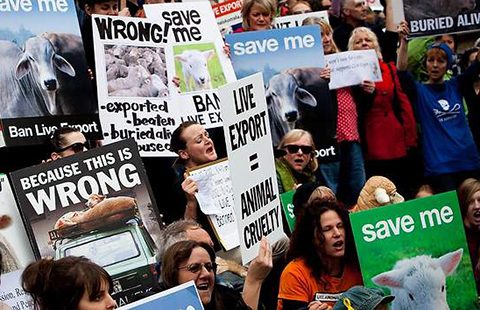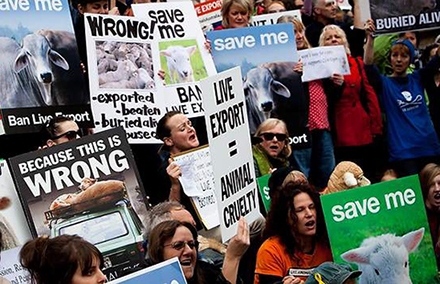Differing responses to cattle slaughter in Indonesia and Vietnam shows Australia’s bias when it comes to our neighbours.
You may have missed it, but, on 19 May, Animals Australia released a photo of cattle being slaughtered with a sledgehammer in northern Vietnam. This is not the first time the ethics of Australia’s live export trade has been questioned.
In 2011 the Australian Broadcasting Corporation’s Four Corners program featured Indonesian abattoirs beating, whipping and kicking cattle prior to slaughter.
However these two cases, while objectively similar, had very different responses by the Australian public and government.
In 2011 the release of the story led to public outrage and a ban on the live export trade to Indonesia by the Minister for Agriculture. In 2015, no such response has occurred.
While important, the response (or lack of it) doesn’t highlight issues of ethical practice in slaughterhouses and of Australia’s live export trade.
Rather, it shows the different ways both issues were perceived in Australia. One is a tale of public outrage, of diplomatic fallout, of policy change. The other is a tale of an issue which barely made a blip on our collective radars.
Is it that Australia learnt from the hasty reaction in 2011? Or does this say something more about how Australian policy and public perception is different for Indonesia than for Vietnam?
In 2011 the Four Corners footage lead to a quick response by a government bowing to public and backbench pressure. Public outrage was quick to collect and on the weekend after the airing of the footage anti-live export rallies brought together thousands of Australians to pressure for the banning of exports to Indonesia. By 2 June 2011, three days after the program aired, a petition asking the government to end live exports to Indonesia had 167,053 signatures.
The morning after the airing of the footage the then Agriculture Minister Joe Ludwig suspended exports to the 11 Indonesian abattoirs featured in the program and launched a review of the whole supply chain of Australian cattle exports to Indonesia. By 6 June the export of all cattle to Indonesia was suspended.
This was remarkable for a number of reasons: it was done without consultation from farmers and the Indonesian government. It hit the cattle industry, for whom Indonesia accounts for half of the live export market, and Indonesia, for whom Australian beef was 25 per cent of the beef market in 2011, hard. It also demonstrated a lack of understanding of the process of cattle exports in Indonesia, where it is difficult to track cattle to local slaughterhouses once they arrive in the country.
In 2015 a different tale is to be told. The government has dismissed any thought of a ban. The allegations levelled at Vietnamese slaughterhouses follow a boom in exports to the country. Vietnam is now the second biggest market, after Indonesia, for Australian cattle. When questioned about how the government will respond to the allegations levelled at Vietnamese slaughterhouses, Prime Minister Abbott was quick to criticise the government for events in 2011. ‘Catastrophic’, ‘crazy’ and a ‘foreign policy blunder’ was how he described it. Treasurer Joe Hockey ruled out a ‘kneejerk’ reaction of banning live cattle trade to Vietnam.
What we haven’t seen in 2015 was the public outrage that was apparent in 2011. There has not been widespread protests, or petitions that have recorded support in the hundreds of thousands.
Perhaps the difference is responses in these two cases lies in our perceptions of Indonesia and Vietnam.
For many Australians, Indonesia is perceived as a holiday destination, as a Muslim country, or in relation to refugees, poverty, terrorism and drug trafficking. Lowy Institute polling in 2014 found that 57 per cent of Australians would describe relations with Indonesia as ‘friendly’ and 36 per cent thought the relationship was ‘unfriendly’ (seven per cent thought neither or had no view). In 2014, only seven per cent of Australians thought our relationship with Indonesia was getting better.
By way of contrast, in Lowy Institute’s polling of how Australians feel about other countries, Vietnam is not even included in the list. It is clear that Vietnam does not inhabit the space in Australia’s psyche that Indonesia does. As we see in the current case of Vietnam, the response to the allegations did not strike the cord that it did with Indonesia in 2011.
The response in 2011 is symptomatic of the way in which Australia responds to Indonesia. It is a relationship that all too often suffers from the issues making headlines and not consistency. Former Prime Minister Paul Keating has criticised the management of the bilateral relationship in this way, imploring in 2012 that ‘focus on this country should be a major imperative driving our foreign policy’.
Instead this focus is often side-tracked by issues that capture the frustration of the Australian press, public and parliament. It appears that when it comes to Indonesia, we cannot separate the policy issues from the complex history and politics of the bilateral relationship. The cattle case of 2011 is one of many examples of how Australian policy regarding Indonesia prioritises the transactional over our longer-term interests.
It goes without saying that there are a multitude of reasons for the dichotomous responses to these two cases. Yes, government may have learnt from the 2011 case, and a Coalition government would be less likely to ban an important agricultural trade than a Labor government. Perhaps, as a public we are not as outraged by stories the second time around.
However we should also reflect whether the differences in the response was because of who was doing the incorrect thing, as much as it was about what was being done.
Natasha Burrows is a master’s student at the University of Technology Sydney, and has completed honours in government and international relations researching Indonesia at Sydney University. She has also worked as a communications officer for the Australian Consortium for ‘In-Country’ Indonesian Studies in Yogyakarta.
 Facebook
Facebook  Twitter
Twitter  Soundcloud
Soundcloud  Youtube
Youtube  Rss
Rss 
